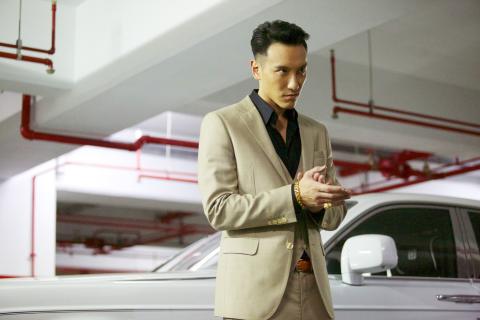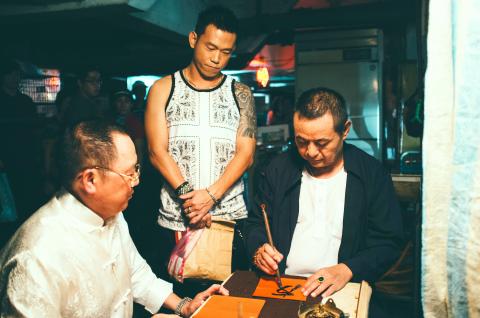Joe Lee (李運傑) packs plenty into his latest film, Gatao, a gangster drama that features plenty of bloodshed, turf wars, romance and familial bonding.
Unfortunately none of these tropes click.
Despite superior production values and a handsome cast led by Alien Huang (黃鴻升) and Sunny Wang (王陽明), the film fails to depict the fascinating world of gatao — Taiwan’s criminal world — and instead devolves into soap-opera frippery filled with narrative loopholes and false emotions.

Photo courtesy of Winday
In the beginning of Gatao, gang life involves street fights with sticks and knives, but everyone is under the control of Boss Yong (Tsai Chen-nan, 蔡振南). To Xiong (Huang), who is arrested during a turf battle, serving time for the gang is proof of brotherhood. Upon his release from prison, Xiong is immediately promoted by Boss Yong to oversee a traditional market where he grew up.
At first, life at the market is good. Xiong knows everyone and takes up the responsibility to look after the shopkeepers. He also strikes up a romance with childhood friend Lei Lei (Christina Mok, 莫允雯). Meanwhile, Xiong’s popularity grows, becoming a threat to Yong’s right-hand man Qing Feng (Sun Peng, 孫鵬),who has a crush on Lei Lei, and believes he is next in line to head the gang.
Things quickly deteriorate when Michael (Wang), the US-educated son of the late rival-gang leader, returns to claim his throne. Depicted as crude and money-driven, the entrepreneurial Michael sees himself as a property developer and has set his mind on what he views as a profitable urban renewal project. But Michael’s plan involves tearing down the market.

Photo courtesy of Winday
Conflicts and bloodletting soon ensue. Torn between his responsibility to the gang and his love for the grandmother who raised him and Lei Lei, Xiong now must make difficult choices that eventually lead to betrayal and murder.
The film’s promising examination of traditional values and runaway capitalism largely goes astray. The motives and struggles of the characters are written and performed, but never felt and conveyed. Throughout the over 100-minute long screening time, there is a constant bombardment of melodramatic cliches and genre gimmickry, leading to nothing more than lame mimicry.
One thing worth mentioning is the film’s lush cinematography that graciously captures a familiar side of Taiwanese life, ranging from fluorescent-lit, crowded interiors to the messy, bustling night markets.

Photo courtesy of Winday

A vaccine to fight dementia? It turns out there may already be one — shots that prevent painful shingles also appear to protect aging brains. A new study found shingles vaccination cut older adults’ risk of developing dementia over the next seven years by 20 percent. The research, published Wednesday in the journal Nature, is part of growing understanding about how many factors influence brain health as we age — and what we can do about it. “It’s a very robust finding,” said lead researcher Pascal Geldsetzer of Stanford University. And “women seem to benefit more,” important as they’re at higher risk of

Eric Finkelstein is a world record junkie. The American’s Guinness World Records include the largest flag mosaic made from table tennis balls, the longest table tennis serve and eating at the most Michelin-starred restaurants in 24 hours in New York. Many would probably share the opinion of Finkelstein’s sister when talking about his records: “You’re a lunatic.” But that’s not stopping him from his next big feat, and this time he is teaming up with his wife, Taiwanese native Jackie Cheng (鄭佳祺): visit and purchase a

April 7 to April 13 After spending over two years with the Republic of China (ROC) Army, A-Mei (阿美) boarded a ship in April 1947 bound for Taiwan. But instead of walking on board with his comrades, his roughly 5-tonne body was lifted using a cargo net. He wasn’t the only elephant; A-Lan (阿蘭) and A-Pei (阿沛) were also on board. The trio had been through hell since they’d been captured by the Japanese Army in Myanmar to transport supplies during World War II. The pachyderms were seized by the ROC New 1st Army’s 30th Division in January 1945, serving

The People’s Republic of China (PRC) last week offered us a glimpse of the violence it plans against Taiwan, with two days of blockade drills conducted around the nation and live-fire exercises not far away in the East China Sea. The PRC said it had practiced hitting “simulated targets of key ports and energy facilities.” Taiwan confirmed on Thursday that PRC Coast Guard ships were directed by the its Eastern Theater Command, meaning that they are assumed to be military assets in a confrontation. Because of this, the number of assets available to the PRC navy is far, far bigger